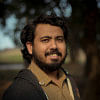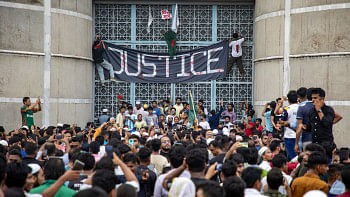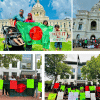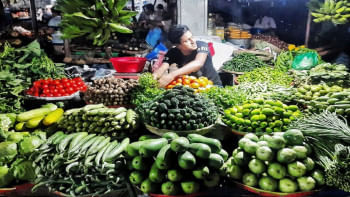A walk through free (?) Dhaka

People in Bangladesh went to sleep on Sunday night, August 4, shaken by the horror of the death of around 100 people throughout the day. The days leading up to it were no less horrific. What started as an anti-discrimination movement became a nine-point movement for government accountability and eventually morphed into a one-point demand for the government's resignation. The death of hundreds in the span of just under three weeks over these reasonable demands had kept the nation suspended in dread.
The morning of August 5 was no different. The Anti-Discrimination Student Movement had called for a "Long March to Dhaka" the day before. As people were expected to pour into Dhaka from across the country, first the prospect, and then the news of more needless deaths consolidated the dread we had carried over from the month of July into August.
But then the tide turned.
The first sign of the shifting winds came with the Chief of Army Staff's announcement to make a rare address to the nation at 2:00pm. In different parts of Dhaka, news of clashes between protesters and law enforcement turned into news of law enforcement standing aside as people flooded the streets.
We dared to join the tide as well. From inside Bashundhara R/A, where people famously keep to themselves, processions of 20, 40, or even more came out of each block. The chants of Palaise re palaise, Hasina palaise (Fled, fled! Hasina has fled!) rang out through the usually quaint streets, all the way to the raucous intersection in front of Jamuna Future Park at Nadda. Groups gathered in circles, dancing, clapping, and chanting. Their faces betrayed unbound happiness, relief, and the outpouring of anger and dissent that had been repressed for years. To us, it seemed that many were at a loss as to what they wanted to say. Most of them could only muster one immensely strong word: "Bhua."
The expressions of happiness, although simple, felt raw. People randomly handed out food and water for free, to our surprise—surprise because we don't remember in our collective memory what these little acts of kindness and camaraderie in this country looked like. Rickshaw-pullers and CNG auto-rickshaw drivers joined in the celebrations. The first rickshaw-puller we asked to take us towards Dhaka South apologetically refused, saying he wanted to go the opposite direction and celebrate with the crowd, understandably so. The rest of the way, no rickshaw-puller or CNG auto-rickshaw driver refused to go the mile towards any direction, nor did they try to negotiate the fare. One of them said, "Joto khushi den bhara" (Pay however much you want to).
In Gulshan, we saw people chant slogans from inside their Land Rovers. On foot, people were louder. On the streets, there were children dressed in red in the arms of their parents, there were elderly citizens with energy beyond their years, and there were groups of young people whose beaming faces reflected their sense of achievement. We could see it on their faces—the unfettered show of joy and the proud show of freedom in their gait. The collective sigh in the air was almost audible.
It was not all rosy. As expected, a deluge of people angry at law enforcement after weeks of face offs, when left to their devices on the streets, lashed out at any symbol of perceived government power. Police boxes, political offices of the Awami League, and a number of unidentifiable streetside structures were set on fire in Tejgaon Industrial Area. Smoke hung thick in the air and it was hard to breathe, and while people everywhere were armed with sticks and pieces of wood, in some areas, the weapons were of a more sinister nature. In Karwan Bazar, buses in front of government offices lay burnt and broken. On Kazi Nazrul Islam Avenue, which served as the main artery for people moving from Shahbagh towards Ganabhaban, the crowd hurled brickbats towards the building that houses the office of ATN News, disregarding the safety of parts of the same crowd who were walking on the road right under it.
By 4:30pm, some were using the same road to return after having played their part in the breach of the Ganabhaban and the Prime Minister's Office in Bijoy Sarani. People displayed their loot, which included everything from expensive looking china to useless looking sofa cushions. The expressions on their faces, that would have otherwise looked brave, seemed unnerving. In the same procession where a police car was being flattened by a score of angry citizens, a hundred yards behind, a boy plucked a yellow flower from a roadside garden inside a building for the girl who was with him, making vivid the fact that it is a day for the chaotic expression of emotions—both good and bad.
Bangladesh has gone through a day of historical proportions, and the people on the streets seem to know this. While the struggles, sacrifices, and sentiments that led to this moment make us hopeful that history will look favourably upon August 5, 2024, the people of Bangladesh need to learn how to pull together and build the country back up for that to happen.
Azmin Azran and Syeda Maisha Ali are journalists at The Daily Star.
Views expressed in this article are the author's own.
Follow The Daily Star Opinion on Facebook for the latest opinions, commentaries and analyses by experts and professionals. To contribute your article or letter to The Daily Star Opinion, see our guidelines for submission.


 For all latest news, follow The Daily Star's Google News channel.
For all latest news, follow The Daily Star's Google News channel. 









Comments